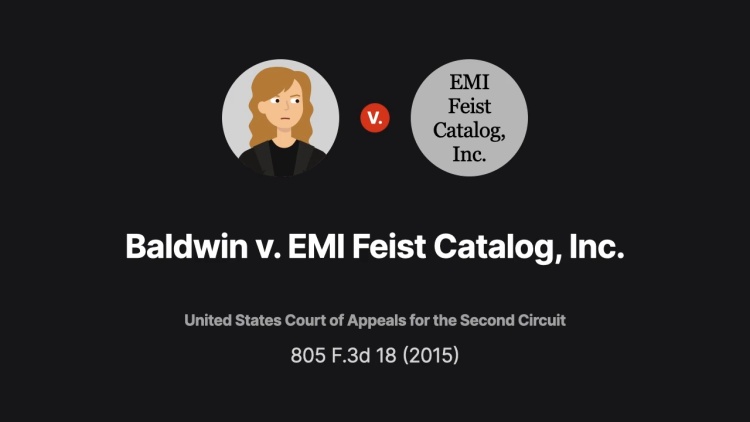Baldwin v. EMI Feist Catalog, Inc.
United States Court of Appeals for the Second Circuit
805 F.3d 18 (2015)
- Written by Rose VanHofwegen, JD
Facts
Fred Coots and Haven Gillespie wrote “Santa Claus is Comin’ to Town” in the 1930s. In 1934, when copyright law still used a dual-term structure, Coots and Haven sold the song’s initial copyrights to EMI Feist Catalog, Inc.’s (EMI’s) (defendant’s) predecessor. In 1951, Coots granted EMI the renewal rights until 1990. In 1976, Congress overhauled the copyright laws, replacing dual-term structure with one term lasting the author’s life plus 50 years. For works already in renewal, the 1976 act extended renewal terms to 75 years, but only for rights created after January 1, 1978. In 1981, Coots’s attorney negotiated a new agreement transferring “all rights and interests whatsoever” to EMI. In 1998, another act again extended copyright terms still within renewal to 95 years after initial registration, effectively extending the song’s renewal term until 2029. In 2007, Coots’s attorney, representing Coots’s heirs Gloria Coots Baldwin, Patricia Bergdahl, and Christine Palmitessa (plaintiffs), served a termination notice purporting to terminate the 1981 renewal rights effective December 15, 2016, but it was never actually recorded. The heirs served and recorded another termination notice in 2012 designating December 15, 2021, as the termination date. EMI countered that its present rights stemmed from the 1951 grant, not the 1981 grant, making its current rights pre-1978 rights not terminable under § 203. The heirs sued, asking the court to declare either the 2007 or 2012 termination notice valid. The trial court granted EMI summary judgment, reasoning that the 1981 grant transferred only additional renewal rights, so EMI’s current underlying rights stemmed from the 1951 grant and thus not subject to termination under § 203. The heirs appealed.
Rule of Law
Issue
Holding and Reasoning (Livingston, J.)
What to do next…
Here's why 911,000 law students have relied on our case briefs:
- Written by law professors and practitioners, not other law students. 47,100 briefs, keyed to 997 casebooks. Top-notch customer support.
- The right amount of information, includes the facts, issues, rule of law, holding and reasoning, and any concurrences and dissents.
- Access in your classes, works on your mobile and tablet. Massive library of related video lessons and high quality multiple-choice questions.
- Easy to use, uniform format for every case brief. Written in plain English, not in legalese. Our briefs summarize and simplify; they don’t just repeat the court’s language.





